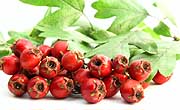Hawthorn Herb

Hawthorn is a common shrub that grows up to five feet tall on hillsides and in sunny wooded areas of North America, Europe, western Asia, and North Africa. They usually have thorns, clusters of white (rarely rose-colored) flowers in the spring, and colorful orange, red, or yellow (rarely blue or black) fruits in the fall. The fruits, called haws, resemble tiny apples.
“I call this herb ‘the wise man’s digitalis’ in tribute to the excellent medicine, derived from the foxglove plant, that cardiologists once used to strengthen the heart and reduce how rapidly it beats,” says Dr. Atkins in his book Dr Atkins Vita-nutrient Solution. “To our great disservice, pharmaceutical companies extracted but a single one of foxglove’s constituents and created a different drug, digoxin, whose side effects include heart blockages and rhythm disturbances.”
Hawthorn extract works just as well as digoxin and its predecessor with virtually no side effects or long-term risks. In my opinion, the herb should be prescribed as a matter of course to every person with a cardiovascular problem, says Dr. Atkins.
“In many gentle ways, hawthorn impressively addresses almost every major factor involved in heart disease. By keeping blood vessels relaxed, it reduces blood pressure and permits a freer flow of blood to the heart muscle. Better blood flow, in turn, increases the heart’s oxygen supply,
allowing the muscle to pump more efficiently and with less strain. Additionally, through its influence on inflammation and allergic reactions, the herb brings some therapeutic relief from chest pains (angina), an unusually fast heartbeat (tachycardia), shortness of breath and hypertension.
“The extract is quite potent. The usual dosage is 240-480 mg daily. If you need heart medication, use it only under a doctor’s guidance. Because it functions much the same way as heart medications, it may make the medications excessive, and the doctor will probably have to lower the dosages of some medications.”
|